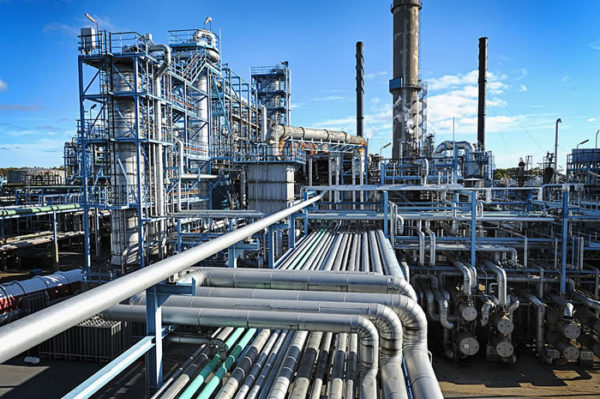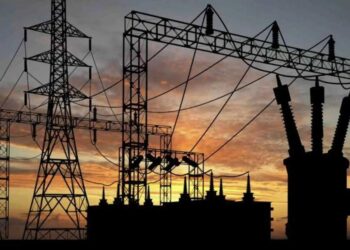 Nigeria may be seeing some relief as many of the country’s major crude oil terminals are now back to operations, following repairs which will enable her make substantial crude oil export in the coming days.
Nigeria may be seeing some relief as many of the country’s major crude oil terminals are now back to operations, following repairs which will enable her make substantial crude oil export in the coming days.
The terminals, Forcados, Escravos, Qua Iboe and Bonny export terminals, were shut in the wake of attacks by militants on the pipelines which service them.
The coming on stream of the terminals is also a big relief to the country in terms of foreign exchange earnings, as she will now be able earn more forex to meet obligations. With this development the country’s crude production is set to rise by another 540,000 barrels per day (bpd) .
Some of the operators who are directly involved in the operations of the terminals have however denied knowledge of any crude oil lifting yet. While repairs have been completed on the pipelines which were shut down following damage by militants in February, the operators want to avoid making a formal announcement of resumption of exports from the facility.
This is because they fear it would be an invitation to another major attack given the heightened tensions in the Niger delta. The peace moves that were being proposed between the Niger Delta Avengers and the government have stalled after prominent leaders from the region shunned a government-initiated meeting in Abuja planned for September 26.
Already, some pipelines on the outer reaches of the Forcados system have come under attack from the Niger Delta Greenland Justice Mandate, helping set off the apprehension of Shell and small independents, such as Seplat and Shoreline Energy, which use the Forcados terminal to export their crude. (Though the rainy season is not over, the NDA is frustrated and no longer planning to wait until November). Though the militant group known as Niger Delta Avengers (NDA) claimed it attacked the Bonny crude export line, industry stakeholders think the group is planning to disable the Forcados line as soon as it can. And because of this, Shell will not announce the restart of Forcados but would likely quietly resume exports from there this week. This unannounced resumption this week of exports is not likely to work as Shell plans. They cannot control media reports entirely. There are too many leaks. Word is already out that buyers are purchasing advance loads of crude from Forcados in anticipation.
Igo Weli, the General Manager External Relations for Shell told Business Day that repairs work is still being effected on the pipeline. But when asked when crude oil lifting would commence, he said as soon as soon as the repair is completed.
In the same vein, an official of ExxonMobil, contacted to confirm the reports that lifting of crude has started, said. “I don’t know where they got their reports from, but as far as I am concerned, the situation at the terminal is still the same as it was two months ago. The company is not lifting anything”.
Official of the Nigerian National Petroleum Corporation (NNPC) refused to comment on the situation , as Garba Deen Mohammed, group general, Manager Corporate Affairs of the corporation, did respond to the text messages and telephone calls put through to him.
But other stakeholders in the industry say repair work on Forcados and Qua Iboe terminals has been completed and that some level of evacuation of what remains at the Forcados terminal before the attack is currently being done preparatory to pumping new products from various fields.
One senior industry source said the Nigerian Petroleum Development Company (NPDC) a subsidiary of the NNPC was expected to commence pumping crude oil through the Forcados pipeline by last weekend.
Thereafter companies like Seplat, Neconde Energy and Pan Ocean would follow, the source said.
Exxon Mobil’s Qua Iboe export stream, Nigeria’s largest, had been under force majeure since July, following a leak in the 48-inch pipeline which carries the flow to the export terminal. While the Shell Petroleum Development Company of Nigeria Limited (SPDC), which operates the Forcados terminal, had also declared force majeure on exports on February 22 after a sub-sea pipeline was damaged.
Shipments of Qua Iboe crude averaged 340,000 bpd last year, according to Bloomberg estimates, and Forcados averaged 200,000 bpd.
Both look to load their first cargoes since halting, on 28-29 September.
“The resumption in Qua Iboe and Forcados oil exports could be potential game changers in the coming days,” says Bismarck Rewane, an economist and the CEO of Financial Derivatives Company.
Nigeria’s record 2016 budget has grown increasingly untenable, as oil revenue on a prorata basis, falls short of the targeted N820 billion.
Its local currency, the naira has also taken some bashing and the limit to defending it is ever more visible, after external reserves declined to less than $25 billion last month.
Nigeria was ousted as Africa’s largest oil producer by Angola in the second quarter of 2016, following a decline in output to 1.5 mbpd while Angola’s production output was steady at 1.7 mbpd.
An additional 540,000 barrels would boost Nigeria’s current 1.5 mbpd to the tone of 2 million bpd, and would see Nigeria return to top spot in October.












